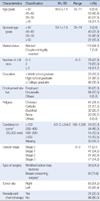Abstract
Purpose
The purpose of this study was to investigate the influence of stress, spousal support, and resilience on the types of coping among women with breast cancer.
Method
Using a cross-sectional survey design, a total of 120 participants, diagnosed with breast cancer, had a mass removal surgery, and were fluent in Korean, were recruited at a cancer center in Seoul, Korea. Self-reported questionnaires of stress, spousal support, resilience, and ways of coping were administered upon the permission from the original developers. Data were analyzed using SPSS 22.0 Win program.
Result
Ways of coping was positively correlated with spousal support, resilience, and stress. Positive correlations were found between problem-focused coping, spousal support, and resilience. Positive correlations were found between emotion-focused coping with stress and resilience. Hierarchical multiple regressions revealed that spousal support had significant moderating effect on the relationship between stress and emotion-focused coping.
Conclusion
Women perceived their diagnosis and surgery as more stressful, they more like to use emotion-focused coping. Women with more spousal support and resilience were found to use problem-focused coping more. Based on the findings of this study, a tailored intervention for women with breast cancer for improving their coping is expected in future research.
Figures and Tables
Fig. 1
Moderation Model: Spousal Support Moderates the Relationship between Stress and Emotion-focused Coping.

Table 1
Demographic Characteristics and Disease Characteristics (N=120)

Table 2
Descriptive Statistics for Outcome Variables (N=120)

References
1. Jung KW, Won YJ, Kong HJ, Oh CM, Lee DH, Lee JS. Cancer statistics in Korea: incidence, mortality, survival, and prevalence in 2011. Cancer Res Treat. 2014; 46(2):109–123.

2. Suh EE, Park YH, Kim S. The patients' experiences of the diagnosis and pre-treatment period of breast cancer. J Korean Acad Fundam Nurs. 2008; 15(4):495–503.
3. Antoni MH, Lehman JM, Kilbourn KM, Boyers AE, Culver JL, Alferi SM, et al. Cognitive-behavioral stress management intervention decreases the prevalence of depression and enhances benefit finding among women under treatment for early-stage breast cancer. Health Psychol. 2001; 20(1):20–32.

4. Kwon EJ, Yi M. Distress and quality of life in breast cancer survivors in Korea. Asian Oncol Nurs. 2012; 12(4):289–296.

5. Suh EE. The processes of coping with breast cancer among Korean women. Korean J Stress Res. 2008; 16(4):305–315.
6. Lazarus RS, Folkman S. Stress, appraisal, and coping. New York: Springer;1984.
7. Cuevas BT, Hughes DC, Parma DL, Treviño-Whitaker RA, Ghosh S, Li R, et al. Motivation, exercise, and stress in breast cancer survivors. Support Care Cancer. 2014; 22(4):911–917.

8. Chung C, Hwang E, Hwang S. Marital intimacy and quality of life in women with breast cancer. J Korean Oncol Nurs. 2009; 9(2):122–128.
9. Duggleby W, Bally J, Cooper D, Doell H, Thomas R. Engaging hope: the experiences of male spouses of women with breast cancer. Oncol Nurs Forum. 2012; 39(4):400–406.

10. Gremore TM, Baucom DH, Porter LS, Kirby JS, Atkins DC, Keefe FJ. Stress buffering effects of daily spousal support on women's daily emotional and physical experiences in the context of breast cancer concerns. Health Psychol. 2011; 30(1):20.

11. Hasson-Ohayon I, Goldzweig G, Braun M, Galinsky D. Women with advanced breast cancer and their spouses: diversity of support and psychological distress. Psychooncology. 2010; 19(11):1195–1204.

12. Lewis FM, Fletcher KA, Cochrane BB, Fann JR. Predictors of depressed mood in spouses of women with breast cancer. J Clin Oncol. 2008; 26(8):1289–1295.

13. Wagnild GM, Collins JA. Assessing resilience. J Psychosoc Nurs Ment Health Serv. 2009; 47(12):28–33.

14. Kang G, Oh S. Effects of mndfulness meditation program on perceived stress, ways of coping, and stress response in breast cancer patients. J Korean Acad Nurs. 2012; 42(2):161–170.

15. Jang S. Effects of meditation program on power, anxiety, depression and quality of life in women with breast cancer. J Korean Acad Psychiatr Ment Health Nurs. 2013; 22(3):205–215.

17. Nam KS. A study on the correlation between spouse support and the body image of female patients who have done mastectomy and hysterectomy [dissertation]. Seoul: Ewha Womans Univ;1988.
18. Wagnild GM, Young HM. Development and psychometric evaluation of the resilience scale. J Nurs Meas. 1993; 1(2):165–178.
19. Mishel MH, Sorenson DS. Revision of the ways of coping checklist for a clinical population. West J Nurs Res. 1993; 15(1):59–74.

20. Kotrlik J, Higgins C. Organizational research: determining appropriate sample size in survey research appropriate sample size in survey research. Inf Technol Learn Perform J. 2001; 19(1):43–50.
21. Do HK. Stress and coping with cancer patients [master's thesis]. Seoul: Kyung Hee Univ;2008.
22. Kim EJ. Hospitalization-related stress and coping strategies of colon cancer patients [master's thesis]. Seoul: Ewha Womans Univ;2007.
23. Song YS. Determinants of resilience of the physically disabled at home [master's thesis]. Pusan: Kosin Univ;2004.
24. So HS. Changes on the uncertainty, ways of coping, and depression for patients with uterine cervical cancer during the early adaptation process: a longitudinal study [dissertation]. Seoul: Yonsei Univ;1996.
25. Kim HY, So HS. A structural model for psychosocial adjustment in patients with early breast cancer. J Korean Acad Nurs. 2012; 42(1):105–115.

26. Lindley P, Walker SN. Theoretical and methodological differentiation of moderation and mediation. Nurs Res. 1993; 42(5):276–279.

27. Baron RM, Kenny DA. The moderator-mediator variable distinction in social psychological research: conceptual, strategic, and statistical considerations. J Pers Soc Psycho. 1986; 51(6):1173–1182.

28. Bennett JA. Mediator and moderator variables in nursing research: conceptual and statistical differences. Res Nurs Health. 2000; 23(5):415–420.

29. Kim YM, Park HS. Relationship between perceived spouse support and health promoting behavior in the mastectomy patients. Asian Oncol Nurs. 2014; 14(4):203–211.

30. Lee EK. A study on factors affecting cancer patients. J Korean Acad Soc Nurs Educ. 2007; 13(1):52–58.




 PDF
PDF ePub
ePub Citation
Citation Print
Print




 XML Download
XML Download